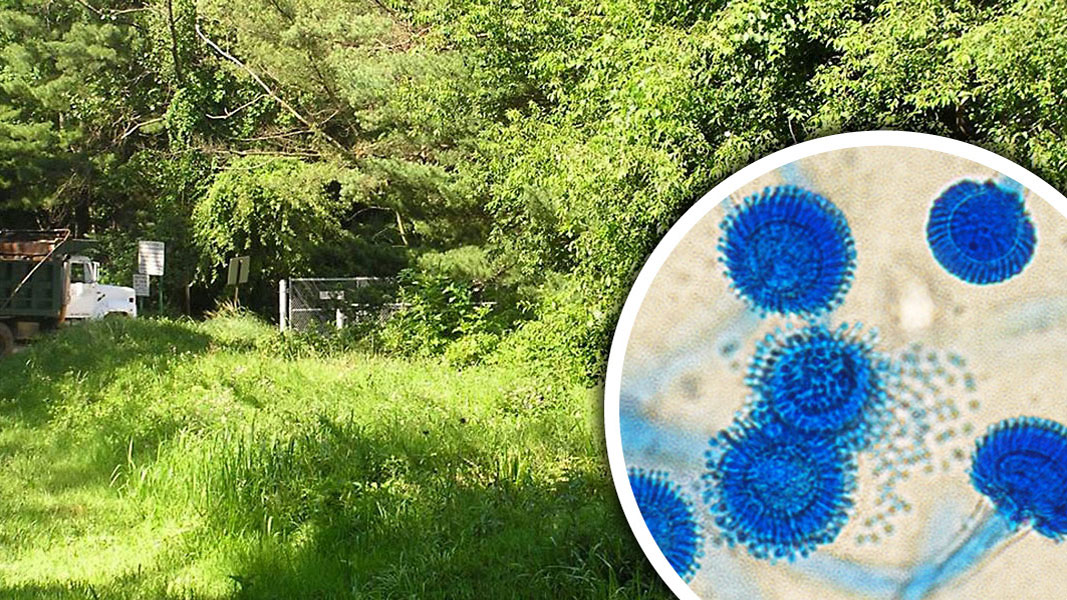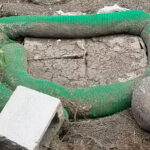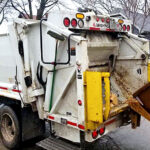Top: A heavily vegetated buffer zone around the composting site helps to control dispersion when turning piles. Photo by Craig Coker. Inset: Aspergillus Fumigatus. Image courtesy Ufficio Comunicazione, Azienda Ospedaliera SS. Antonio e Biagio e Cesare Arrigo, Alessandria and Biblioteca Biomedica Centro di Documentazione, CC BY 4.0, via Wikimedia Commons (cropped and manipulated by BioCycle).
The recent BioCycle article on azole-resistant Aspergillus fumigatus raised some questions from readers. We asked Craig Coker, BioCycle Senior Editor and co-author of the article with Dr. Pat Millner, to address the questions in this follow-up post:
To be clear, A. fumigatus fungal spores are literally everywhere — in mulch and leaf piles, gardens, hay barns, and compost piles. Any BioCycle reader who has been to a working composting facility has probably inhaled A. fumigatus fungal spores, but a healthy body’s immune response system kills the spores. Individuals at the greatest risk of an adverse health effect from inhaling A. fumigatus spores are those who are immunocompromised. What does that mean? You can think of your immune system as an internal network of bodyguards. This network is made up of white blood cells, skin cells, antibodies, lymph nodes, and other organs and tissues, like your spleen and bone marrow. They all work together to study, identify, and destroy invaders (like bacteria, viruses and parasites) that cause infection and illness.
A properly functioning immune system will identify invaders the first time they make contact. If the network thinks those invaders are potential threats, your immune system will release signals that cause inflammation to prevent those invaders from reaching other areas of your body, while it works to destroy them. If just one part of your immune system fails to do its job or underperforms, your entire immune system can be weakened or compromised. No bodyguards or fewer bodyguards means that your body is left open to more frequent or abnormal infections that can be more intense and difficult to treat. Some common causes for acquired immunodeficiencies include HIV, cancers like leukemia, and autoimmune disorders like psoriasis, rheumatoid arthritis, Type 1 diabetes, Crohn’s disease, Celiac disease, multiple sclerosis, and lupus. If an immunocompromised person contracts an Aspergillus infection, the resistance of A. fumigatus to common azole-type antifungal drugs increases that person’s risk of severe illness.
A. fumigatus will not survive compost pile temperatures above 55oC (131oF), although there are some references in the literature to finding A. fumigatus at higher temperatures. As it is impossible to guarantee that every cubic inch of every pile or windrow gets above that thermal death temperature every time, there is a high probability that A. fumigatus will be present in the compost from even the best-managed facility. Less frequently managed compost piles, like some community and backyard piles, are almost certain to have A. fumigatus spores.
Composters need to be clear-eyed about minimizing the risks of exposure to A. fumigatus. Steps that can be taken include:
- Only turn piles or windrows for regulatory compliance (e.g., while temperatures exceed 131oF for 15 days) or if pile temperatures exceed 165oF (to reduce the risk of spontaneous combustion).
- If you are composting on a site that does not have a heavily vegetated buffer zone between you and your neighbors, don’t turn windrows or run the final product screen on a windy day (the leaves on vegetation trap A. fumigatus spores).
- Add N95 masks to your inventory of Personal Protection Equipment (PPE) and make them available to employees and visitors.
- Have visitors who are going to be out on the working compost pad during normal operations sign a waiver of liability that states they understand the risks.
- If you’re a community composter or have a backyard compost pile, you might want to wear a N95 mask when turning your piles.
As we learned in the COVID-19 pandemic, biology is very dynamic and the rise in drug-resistant microorganisms in our ecology is a reason to be cautious when working in a biological manufacturing facility like a composting operation.
Craig Coker is co-owner of Star City Compost LLC in Roanoke VA, a senior editor at BioCycle Connect, and CEO of Coker Composting and Consulting. He can be reached at ccoker@cokercompost.com.













